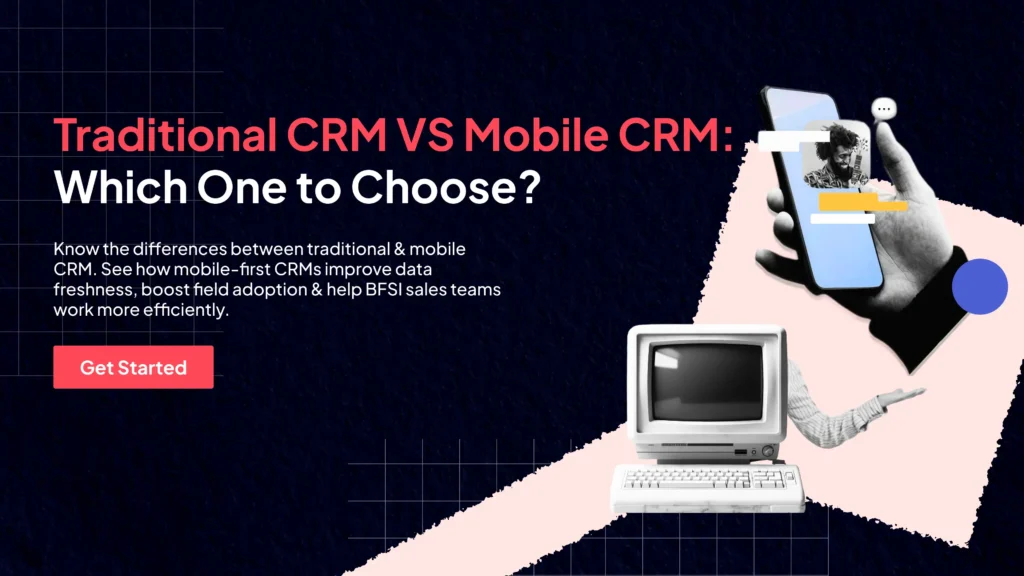The global banking CRM software market is projected to reach $39.2 billion by 2030, growing at a CAGR of 15.7% (Allied Market Research).
If you’re in BFSI, you already know that a CRM isn’t just a database—it’s essential for building trust, offering personalized experiences, and staying connected with your customers across channels.
But adoption is still a challenge. According to Gartner, over 50% of traditional CRM purchases go underused, costing businesses nearly $2 billion annually. The problem? Most CRMs aren’t built for your sales teams in the field. They’re complex, desktop-based, and disconnected from how your teams actually work.
So, can mobile CRMs close the gap—and deliver the value you’re looking for?
In this article, you’ll compare Traditional vs Mobile CRMs, see what the shift means for your sales teams, and explore how platforms like Vymo are helping financial institutions move to a mobile-first future.
What is a Traditional CRM?
A traditional CRM is the kind of system you may already be using—usually desktop- or web-based—designed to help your team store customer data, track sales activity, and generate reports. It works best when your teams are in fixed locations with stable internet access.
Here’s what you typically get with a traditional CRM:
- Centralized Data Storage: Store client details and historical interactions
- Pipeline Management: Track leads and deals across stages
- Reporting: Review dashboards to measure performance
- Standardized Workflows: Ensure consistency across teams
But while traditional CRMs help manage data, they often require manual input, offer limited contextual insights, and restrict access when your teams are in the field or offline.
What is a Mobile CRM?
A mobile CRM is designed to work seamlessly on smartphones and tablets—so your teams can access customer data, update workflows, and log activities in real time, even on the move. If your relationship managers or loan officers spend most of their day in the field, this type of CRM becomes essential for boosting productivity and improving engagement.
Key Features You Can Expect from a Mobile CRM:
- On-the-Go Access: Update client records, schedule follow-ups, and log meetings while you’re on-site with customers.
- AI-Powered Nudges: Get intelligent prompts to take the next best action, whether it’s a call, meeting, or product offer.
- Real-Time Visibility: Let your managers see what’s happening across territories—instantly.
- Offline Functionality: Capture data even when you’re offline. It syncs as soon as you’re reconnected.
- Tool Integrations: Connect with calendars, messaging apps, or internal systems effortlessly.
- Agentic AI Capabilities: Go beyond basic recommendations. Your CRM can autonomously draft outreach, prioritize leads, or trigger workflows—so your team can focus more on customers and less on admin.
If your bank or NBFC relies on field-based teams to manage customer relationships, a mobile CRM isn’t just useful—it’s a game-changer.
Key Differences – Traditional CRM vs. Mobile CRM
Comparing traditional CRM vs mobile CRM features helps you identify which platform is better suited for your team’s workflow, adoption, and performance needs.
| Criteria | Traditional CRM | Mobile CRM |
| Accessibility | Limited to desktops/web access | Accessible via smartphones, tablets, anytime |
| Real-Time Data Updates | Requires manual sync, often delayed | Updates instantly from the field |
| User Experience | Data-heavy, designed for back-office | Intuitive, built for mobile-first workflows |
| AI & Automation | Basic workflow automation | AI-driven nudges, contextual insights |
| Field Productivity | Agents update at day’s end or later | Agents update instantly, reducing lag |
| Connectivity | Requires internet at all times | Often works offline with sync capabilities |
| Adoption Rates | Lower adoption among field teams | Higher adoption due to ease of use |
| Best Suited For | Back-office teams, static data management | Field teams, customer-facing operations |
 Why BFSI Sales Teams are Moving to Mobile CRM
Why BFSI Sales Teams are Moving to Mobile CRM
As a decision-maker in banking or financial services, you’re dealing with agents in the field, compliance overhead, and rising customer expectations. A mobile CRM helps you solve these challenges with real-time access and intelligent workflows.
- Faster Customer Response: Your relationship managers don’t need to wait to get back to a desktop system. They can log customer queries, service requests, or complaints directly from the field—helping your teams respond faster and close issues on the spot.
- Improved Sales Productivity: Smart nudges remind your team about follow-ups, renewal opportunities, or cross-sell prospects. That means fewer missed deals—and higher closure rates.
- Better Managerial Visibility: You get a live view of your team’s activities, meetings, and funnel health. With this insight, you can coach in real time rather than relying on backdated reports.
- Higher Adoption Rates
Since mobile CRMs work just like any smartphone app, your field teams find them intuitive. And higher usage means better data, more accurate insights, and faster decision-making.
Which CRM Should You Choose?
The right CRM for your organization depends on where and how your teams work.
If your sales, service, or relationship management teams operate mostly from fixed locations, a traditional CRM may still meet core needs—like centralizing data, generating reports, and tracking customer interactions. However, you’ll need to account for manual data entry delays and the possibility of lower adoption among employees who spend time in the field.
On the other hand, if your team spends significant time meeting customers in person, traveling between branches, or servicing clients in areas with unpredictable connectivity, a mobile CRM offers clear advantages:
- Instant access to customer information on the go
- Real-time updates for managers and back-office teams
- Higher adoption rates thanks to user-friendly mobile interfaces
- Better field compliance through GPS check-ins, automatic activity capture, and push notifications.
For BFSI organizations, a hybrid approach often works best—retaining the robust data backbone of a traditional CRM while adding a mobile-first engagement layer for field productivity. Solutions like Vymo make this possible by integrating with your existing CRM, adding automation, AI-driven nudges, and offline capabilities without requiring a complete system overhaul.
Tip: Before deciding, map out your team’s daily workflow and identify bottlenecks in customer engagement, data updates, and reporting. This will give you a clearer picture of whether a traditional, mobile, or hybrid CRM model fits your goals.
How Vymo Helps BFSI Leaders Transition to Mobile CRM
If you’re looking to modernize your bank or NBFC’s sales execution, Vymo helps you do it without disrupting your teams or processes. It’s a mobile-first, AI-powered CRM built specifically for BFSI, designed to help you overcome field execution gaps, compliance challenges, and productivity slowdowns.
What Makes Vymo Different?
- Contextual Nudges: Guides agents on the following best action to close more deals.
- Mobile-First Design: Built for field sales, ensuring seamless adoption.
- Real-Time Visibility: Provides managers with instant insights into team activity.
- AI-Powered Forecasting: Helps leaders predict outcomes and plan ahead.
- Proven Results: Trusted by 350,000+ users across 70+ BFSI enterprises worldwide.
Whether you’re managing a distributed sales force or looking to improve post-sale engagement, Vymo empowers your teams to act faster, stay compliant, and drive better outcomes.
Final Thoughts
Traditional CRMs address a significant issue of deeper analytics and have enabled businesses to predict customer behavior in ways they never thought possible. But the shift from traditional CRM to mobile CRM in the BFSI sector is driven by the need for accessibility, real-time updates, and improved customer interaction.
The dynamic nature of today’s BFSI sector necessitates more flexible and responsive solutions. Mobile CRM offers these advantages, making it an essential tool for BFSI professionals striving to provide superior customer service in a rapidly evolving industry.
If you’re ready to move beyond static data management and empower your teams with AI-driven, mobile-first capabilities, book a demo with us and explore how Vymo can help.
 Frequently Asked Questions
Frequently Asked Questions
1. Is mobile CRM secure for handling customer data?
Yes, modern mobile CRMs follow enterprise-grade security protocols, including encryption, role-based access, and compliance with regional regulations such as RBI guidelines for BFSI in India.
2. Can mobile CRM work without internet connectivity?
Yes. Many mobile CRMs offer offline mode, allowing teams to update data and complete tasks without the internet, and then sync automatically when back online.
3. What specific ROI metrics can businesses expect when switching to mobile CRM?
Common gains include more selling time, faster sales cycles, higher lead conversions, better forecast accuracy, and lower admin costs.
4. How customizable are mobile CRMs compared to traditional systems?
Mobile CRMs are highly customizable, allowing tailored workflows, dashboards, integrations, and field-specific features with minimal IT effort.
5. How does Vymo’s mobile CRM work with existing systems?
Vymo integrates with core CRM platforms to add mobile-first capabilities like automatic activity capture, AI-powered nudges, and offline workflows—without replacing your existing system.
6. Are mobile CRMs secure enough for financial institutions?
Yes. Enterprise-grade mobile CRMs include features like end-to-end encryption, secure access controls, compliance monitoring, and regular audits to meet the security needs of financial institutions.



